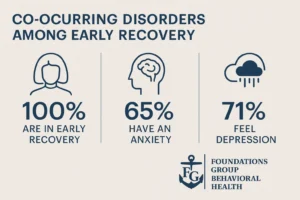You got sober. Maybe recently. Maybe just enough time has passed that you thought it would feel better by now. But instead of peace, you’re sitting in this strange emotional fog. Some days feel electric and scattered. Others feel unbearably still. And underneath it all, anxiety or depression still seem to be steering the ship.
If this sounds familiar, you’re not alone—and you’re not broken.
In early recovery, many people discover that what they thought was just “substance stuff” is also mental health stuff. Bipolar disorder, anxiety, depression—they don’t vanish when the drugs or alcohol are gone. In fact, for many, those underlying struggles become more noticeable once the numbing stops.
So if you’re wondering whether bipolar disorder treatment could also help with your anxiety or depression, the answer is yes—and more importantly, it could help you feel human again.
What exactly happens in bipolar disorder treatment?
Let’s break it down gently. You’re not walking into a sterile, one-size-fits-all system. You’re walking into care that’s designed to meet you where you are—especially if you’re emotionally frayed, newly sober, and unsure what your mind is doing anymore.
At a high-quality program like Foundations Group Behavioral Health, treatment for bipolar disorder often includes:
- Psychiatric evaluation to better understand your emotional patterns and clarify diagnoses
- Medication management, if needed, done slowly and collaboratively
- Individual therapy tailored to bipolar, anxiety, depression, trauma, or co-occurring challenges
- Group therapy that builds real connection—not forced sharing
- Education and skill-building around emotional regulation, relationship repair, and relapse prevention
This is not just about “fixing” mood swings. It’s about helping you build a way of living where you feel more steady inside your own skin.
Can bipolar disorder treatment help with anxiety, too?
Yes—because anxiety is often part of the picture, even when it’s not the headline.
Many people with bipolar disorder also experience:
- Racing thoughts or constant “what ifs”
- Panic attacks
- Dread that sits in your chest for no clear reason
- Social anxiety that makes group settings or even texting back feel impossible
- Physical symptoms: heart racing, tightness, stomach issues
These symptoms don’t exist separately from bipolar disorder—they often intertwine. That’s why good bipolar treatment doesn’t ignore anxiety. It works with it.
Therapists and clinicians in our program are trained to help you untangle anxiety from mood shifts and teach your body and brain how to calm down safely—without using, without numbing, without disappearing.
What if I only feel depression—not mania?
You’re not alone. This is one of the most misunderstood parts of bipolar disorder.
A lot of people only recognize depression—because it’s loud. It slows everything down. It makes getting dressed feel like a mountain. And when you’re newly sober, that heaviness can hit even harder because substances were likely used to push against it.
Here’s what you might not know: There’s a type of bipolar called bipolar II, where the highs are less extreme (hypomania), but the lows are deep and long-lasting. Some people don’t recognize those highs at all—they just know the crash.
If you’re feeling:
- Unmotivated or emotionally flat
- Detached from people you care about
- Disinterested in things that used to bring joy
- Like you’re moving underwater
…and this persists even in recovery, it’s worth exploring bipolar treatment. Not because you’re being labeled. But because you deserve a plan that fits how you actually feel.
Do I need a formal diagnosis before starting treatment?
Absolutely not. In fact, many people come into bipolar disorder treatment unsure if they even have bipolar disorder.
You don’t need a diagnosis to be struggling.
You don’t need certainty to deserve care.
You don’t need to prove anything to get help.
Our job, as clinicians, is to listen to your experience—not just your label. We help clarify what’s really happening over time, gently, with you—not to you.
Whether you’ve been misdiagnosed, underdiagnosed, or never evaluated at all, starting treatment is a powerful way to begin understanding your emotional landscape.
What if I tried treatment before and it didn’t help?
That kind of discouragement runs deep. Many clients come in carrying shame or defeat from past programs that didn’t click—or worse, made them feel unseen.
Sometimes:
- You were in addiction-focused treatment that skipped over the mental health part.
- You were given meds without support to understand them.
- You felt like a number, not a person.
Those experiences can leave scars. But they don’t define what’s possible for you.
Here’s what one client shared after starting care in our program:
“I kept thinking something was wrong with me because nothing was working. Turns out, I’d never been in a place that looked at the whole picture—my anxiety, my depression, the recovery stuff. Once someone connected the dots, I stopped blaming myself.”
– Outpatient Client, Cape Cod
You deserve a fresh start—especially if the old system let you down.
How does bipolar treatment work when you’re newly sober?
Here’s the honest truth: early recovery is one of the most emotionally raw stages of a person’s life.
You’ve taken away the thing that used to regulate your system—whether it was a depressant or a stimulant—and now your emotions are loud.
You may feel:
- Restless or wired without reason
- Lonely even in a room full of people
- Emotionally volatile or numb
- Overwhelmed by small decisions
We structure bipolar disorder treatment in a way that respects that fragility. You’re not expected to perform recovery. You’re invited to feel safe while you relearn yourself.
That’s especially important in our local community. If you’re looking for bipolar disorder treatment in Barnstable County, MA, or nearby areas like Falmouth, we offer programs that understand both the clinical and human sides of what you’re navigating.
Is this just about medication?
No. Medication can be one part—but it’s not the only part.
Some people do well with mood stabilizers or anti-anxiety meds. Others don’t want them, aren’t ready, or haven’t found the right fit. We support all of that.
Real treatment also means:
- Understanding your emotional cycles
- Building coping tools that actually work in the moment
- Addressing the why beneath your symptoms
- Reconnecting you with real human support—not just symptom checklists
Medication can support healing. But healing is never just about meds.
Will I meet others who understand this mix of symptoms?
Yes—and that’s one of the most powerful parts.
In group therapy, you’ll meet people who get it. Who’ve used substances to escape pain they couldn’t name. Who’ve been misread, misdiagnosed, misunderstood. Who’ve sat exactly where you are now—some of them newly sober and hurting. Some of them months in, finally catching their breath.
You’ll find honesty, not perfection.
You’ll find company, not comparison.
You’ll find relief in realizing: Oh, it’s not just me.
What’s the actual goal of bipolar treatment?
Not perfection. Not performance.
The goal is: stability you can live inside.
That might mean fewer spikes in mood.
It might mean more energy in the morning.
It might mean you can sit through a hard moment without needing to disappear.
It might mean you start to trust yourself again.
And that is enough.
Looking for bipolar disorder treatment in Barnstable County?
If you’re in early recovery and wondering whether your anxiety or depression might be part of something deeper—we’re here to explore that with you, not label you.
Foundations Group Behavioral Health offers trauma-aware, human-first bipolar disorder treatment in Cape Cod, MA that supports anxiety, depression, co-occurring struggles, and the lonely in-between space where many people land right after getting sober.
Call 888-685-9730 to learn more about our bipolar disorder treatment services in Cape Cod, MA. You don’t need all the answers to take the first step toward feeling better.









